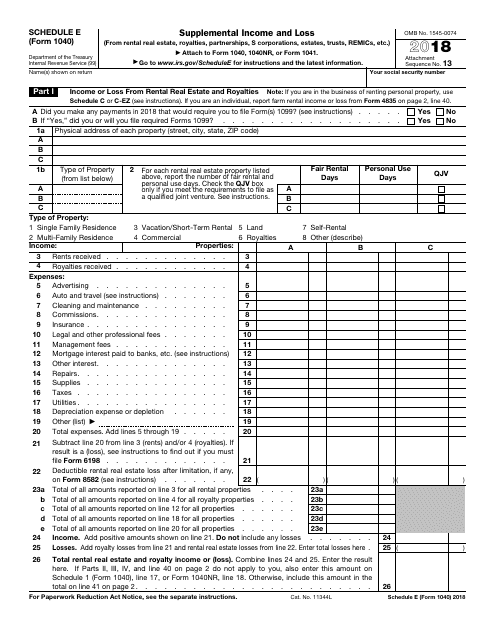Irs Loss From Rental Property Income 3,5/5 9142 reviews
Becoming a landlord presents incredible opportunities for stable passive income. However, on top of the general uncertainty brought forth by a pandemic, renting out property also presents new financial and legal obligations, including taxes. There are several nuances to taxation of rental income, especially since there are differences between how the IRS treats real estate professionals renting out a property compared to those who simply receive supplemental income from rental activity.
Deduct these items on Schedule E to the extent of your rental income: Mortgage interest; Real estate taxes; Other rental expenses; If reporting loss on rental property, it might be limited by the at-risk rules and passive-loss limits. However, a special allowance exists for the passive-loss limits. If the monthly rent payment is less than the. If your rental expenses exceed rental income your loss may be limited. The amount of loss you can deduct may be limited by the passive activity loss rules and the at-risk rules. See Form 8582, Passive Activity Loss Limitations, and Form 6198, At-Risk Limitations, to determine if your loss is limited. However, a loss from a decline in value after conversion to a rental, is generally a deductible loss. As an example, you convert your residence into a rental when the property’s cost basis is $350,000, and its.
Here is what you need to know when it comes to filing rental income taxes in the age of COVID-19.
Questions about the coronavirus pandemic?
Visit the Coronavirus Legal Center and ask a lawyer today.
What COVID-19 tax relief is available for landlords?
For those who haven’t already filed, one big change is that the federal tax deadline for the 2019 tax year and the deadline for Q1 and Q2 estimated tax payments for 2020 have been extended to July 15th. The deadline for making individual retirement account (IRA) and health savings account (HSA) contributions for the 2019 tax year has also been moved to July 15th.
Outside of federal and state deadline changes, landlords should know about the following COVID-19 tax relief options:
Net operating losses carried back 5 years
The limitations on net operating losses have expanded so that you can apply your 2018, 2019, and 2020 net operating losses as far back as five years from when the loss occurred. For example, if you are suffering a loss in 2020 as a result of COVID-19, you can deduct it from taxable income as far back as 2015 to receive a tax credit.
Irs And Rental Property
Business interest expense deductions
The amount of loan interest that your business can deduct for 2019 and 2020 has increased from 30% to 50% of taxable income.
Irs Loss From Rental Property Income Tax
Qualified improvements

Businesses may also be able to write-off costs from improving their facilities immediately rather than having to depreciate them over time.
Emergency refund on corporate alternative minimum tax (AMT) credit
If you made AMT tax payments in 2020, you can claim a refund this year rather than waiting until the end of 2021.
If you are an employer, there is even more government relief available. A CPA or accountant can help you determine what tax credits and deductions are best for your situation.
Do I need to report and pay taxes on income from rental activity?
Generally speaking, if you are making money from operating a rental property, yes, you need to report and pay taxes on your income. Rental activity creates taxable income in a majority of cases. The only exception to this rule is if you rent out your primary residence, such as renting out a bedroom on a homestay website for less than 15 days during the tax year. No income is required to be reported in that case.
Irs Rental Income Worksheet
However, if you rent out your primary residence for longer than 15 days or have a vacation or investment property, you must report and pay tax on the net rental income. In most cases, rental income is considered investment income and it doesn’t trigger self-employment tax like a “side hustle”. However, if you are a real estate professional or looking to make rental activity a full-time gig, you may need to pay self-employment tax in addition to income tax. In some cases, you may be able to avoid this tax by forming a corporation or LLC. Talk to an accountant or a tax lawyer to understand the potential tax benefits or obligations related to your specific situation.
What types of expenses can I deduct as a landlord?
You can deduct expenses associated with rental activity if they are required to maintain the property, find a tenant, solve disputes, comply with the law, and other aspects of collecting rent and keeping your investment safe. The following items are deductible:
- Advertising your rental through property listings, websites, and other methods
- Legal and professional fees
- Property management fees
- Insurance
- Mortgage interest and real estate taxes
- HOA/condo board maintenance fees, if a condo property
- Repair and maintenance labor
- Purchase, installation, and maintenance of appliances and furniture
- Supplies used to get the property in move-in condition
- Legal and professional fees related to the lease or tenant disputes
- Collection agency fees
- State and local taxes on rental activity
- Utilities
Irs Forms For Rental Income
If the property is unoccupied and it takes longer to get a tenant than you anticipated, you cannot deduct the rent that you would have received. You only report the rent that you eventually do receive, but you can deduct the marketing expenses related to attempts to obtain tenants. You can also deduct the operating and maintenance expenses in the time that the property was vacant but available for rent.

If the property does not meet building codes or a complaint is filed against you and the state or city takes action, you cannot deduct any fines or penalties. Only fees paid to attorneys, accountants, and other compliance professionals are deductible, along with local taxes and the labor costs involved in maintaining and improving the property
If my rental activity results in a loss, can I deduct it?
Most small landlords have a limit on the amount of rental loss that you are allowed to deduct. There are specific rules for losses from passive rental activity if you are not a full-time real estate professional such as a realtor or property manager.
Additionally, there are limits on your rental loss if you are renting out your primary residence (or put any other property to personal use).
Do landlords have to issue 1099 forms to contractors?
Form 1099-MISC is used to report payments made to contractors as part of business during the tax year. Payments can include fees for one-time services such as fixing a burst pipe to ongoing fees like lawn care or housekeeping for your rental units. If you paid the contractor more than $600, you may need to file a 1099-MISC. Generally speaking, if you made payments to corporations, paid using a payment processor like PayPal, or hired the contractor through a third-party platform, you do not have to file 1099s for those payments. If you have hired a property management company, the property manager may handle the 1099s for you, but it is important to confirm.
If you are unsure about filing a 1099, a tax lawyer or accountant can help.
What tax deadlines do I have as a landlord?
Tax deadlines for 2020 have been adjusted due to COVID-19, but generally speaking your due dates will vary depending on your business structure. Here are a few key dates to know for next year:

January 31, 2021
- Form 1099-MISC
March 15, 2021
- Form 1065 (Multi-member LLC, LLP or partnership)
- Form 1120-S (S-Corporation)
April 15, 2021
- Form 1040 (Individual tax return, including income from a single-member LLC or unincorporated business)
- Form 1120 (C-Corporation)
There may also be additional state and local deadlines for rental taxes, as well as self-employment taxes and quarterly estimated tax payments if you are a full-time self-employed real estate professional. A CPA or accountant can help you determine all of the deadlines and forms that apply to your specific situation.
Get help when you need it
2020 has been a challenging year for many landlords, and filing taxes for this year inevitably may raise new questions that you’ve never had to consider. If you have questions about the coronavirus pandemic and how it affects your taxes, talk to an accountant for guidance, or visit the Coronavirus Legal Center for Business and ask a lawyer any legal question for free.